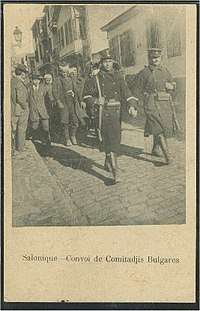Komitadji
Komitadji, Comitadjis, or Komitas (Bulgarian, Macedonian and Serbian: Комити, Serbian Latin: Komiti, Romanian: Comitagiu, Greek: Κομιτατζής, plural: Κομιτατζήδες, Turkish: Komitacı, Albanian: Komit) means in Turkish "committee members". It refers to members of rebel bands (chetas) operating in the Balkans during the final period of the Ottoman Empire. They fought against the Turkish authorities and were supported by the governments of the neighbouring states, especially Bulgaria.[1]

.jpg)
Komitadji was used to describe the members of the Bulgarian Revolutionary Central Committee during the April uprising in 1876,[2][3][4] and Bulgarian bands during the following Russo-Turkish War.[5] The term is often employed to refer later to groups of rebels associated with the Bulgarian Macedonian-Adrianople Revolutionary Committees and the Supreme Macedonian-Adrianople Committee called by the Turks simply the Bulgarian Committees.[6]
In interwar Greece and Yugoslavia the term was used to refer to the bands organized by the pro-Bulgarian Internal Macedonian Revolutionary Organisation and Internal Thracian Revolutionary Organisation, which operated in Vardar and Aegean Macedonia and Western Thrace.[7] In interwar Romania, the term was used to refer to the bands organized by the pro-Bulgarian Internal Dobrujan Revolutionary Organisation, which attacked the Romanian outposts and the Aromanian colonists in Southern Dobruja. During the Second World War this name was used to designate the members of the pro-Bulgarian Ohrana active in Northern Greece.[8]
Other uses
- The term is used by the supporters of FK Vardar.[9]
- Komitadji was the name given to a space-travelling warship of the Earth-based Pax Empire in the science-fiction novel Angelmass (TOR Books, 2001) by Timothy Zahn.
See also
References
- The Making of a New Europe: R.W. Seton-Watson and the Last Years of Austria-Hungary, Hugh Seton-Watson, Christopher Seton-Watson, Methuen, 1981, ISBN 0416747302, p. 71.
The word komitadji is Turkish, meaning literally "committee man". It came to be used for the guerilla bands, which, subsidized by the governments of the Christian Balkan states, especially of Bulgaria.
- Salâhi Sonyel, Minorities and the Destruction of the Ottoman Empire; Turkish Historical Society Printing House, 1993; ISBN 975160544X, p. 232.
- Христо Марков Йонков, Числен, социален и класов състав на революционерите в Априлското възстание 1876: Историко-социологическо изследване на ІV революционен окръг. Изд. на Българската академия на науките, 1993, стр. 34.
- Maiden Tribute, Grace Eckley, Xlibris Corporation, 2007, ISBN 1462838111, p. 20.
- Paul Mojzes, Balkan Genocides: Holocaust and Ethnic Cleansing in the Twentieth Century, Rowman & Littlefield, 2011, ISBN 1442206632, p. 11.
- Historical Dictionary of the Republic of Macedonia, Dimitar Bechev, Scarecrow Press, 2009, ISBN 0810862956, p. Ivii.
- The Comitadji Question in Southern Serbia, Rodolphe Archibald Reiss, Hazell, 1924.
- Plundered Loyalties: Axis Occupation and Civil Strife in Greek West Macedonia, 1941–1949, Giannēs Koliopoulos, C. Hurst & Co. Publishers, 1999, ISBN 185065381X, p. 69.
- FootballDerbies.com - Komiti